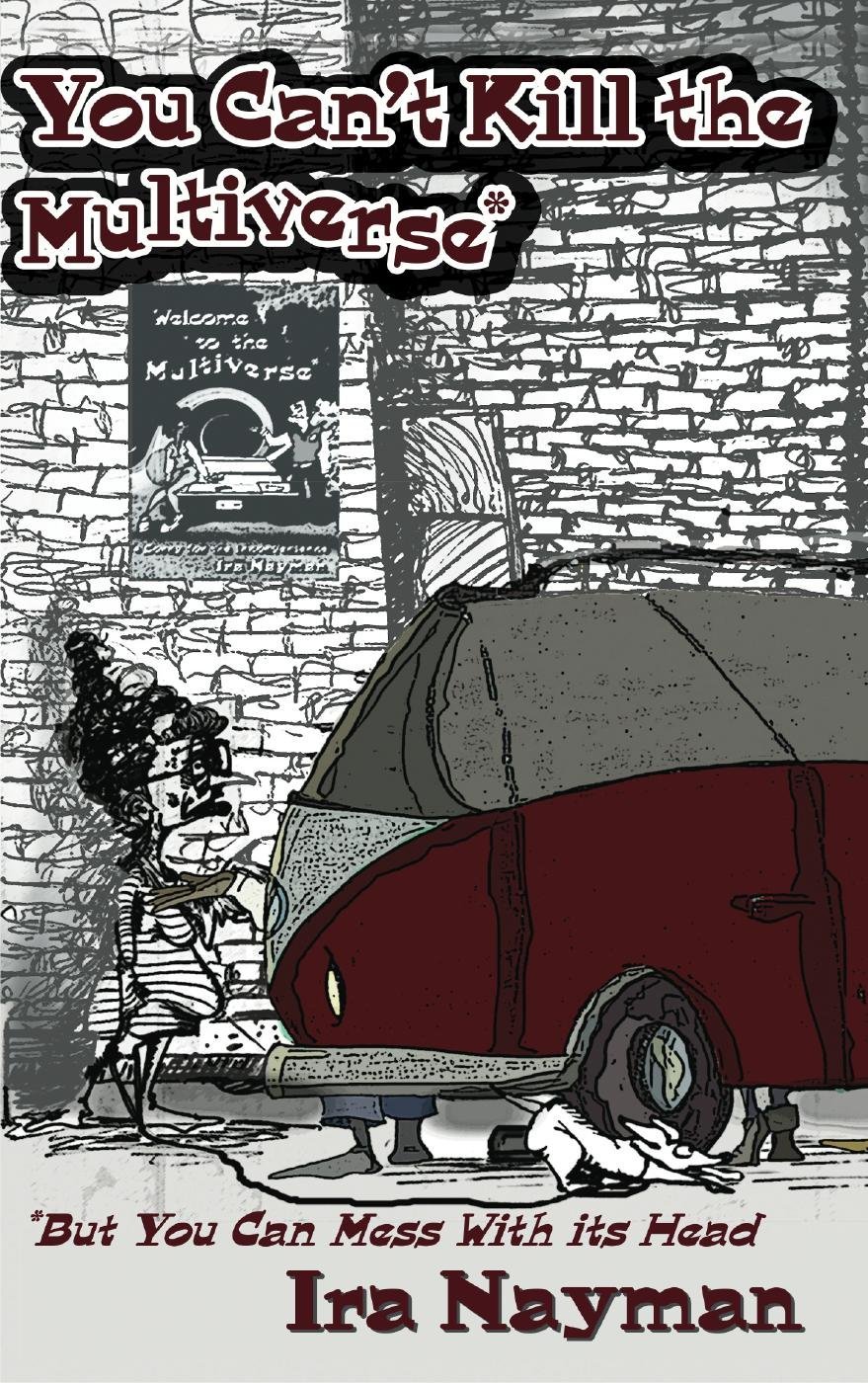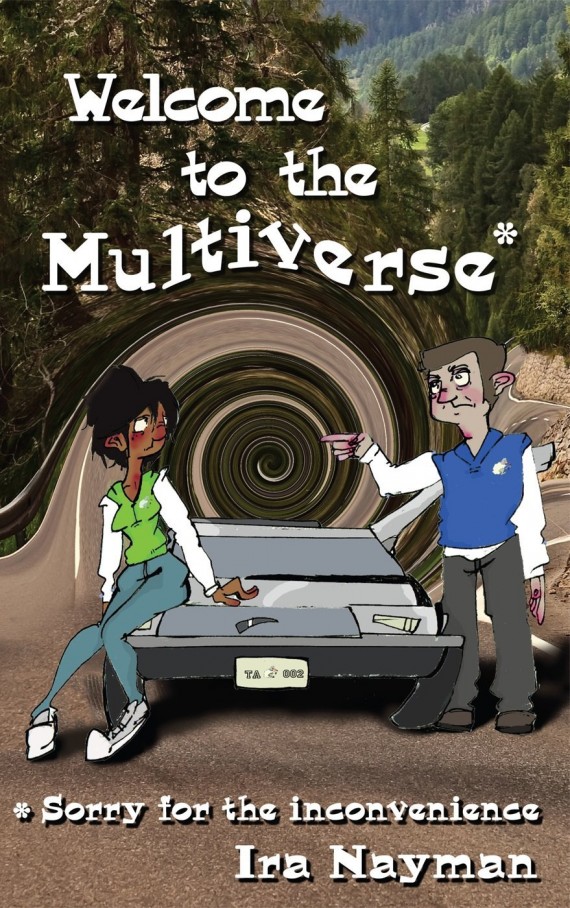
Perhaps I have a persecution complex, but it has always seemed to me that humorous SF/F has been the red-headed stepchild of the publishing industry. While her plain and unremarkable narrative sisters were getting regular invites to the ball, she was at home scrubbing and polishing her prose to no avail since her evil step-publisher wouldn’t let her get anywhere near the Prince (readers). There are signs, however, that her fairy-godmother has finally arrived in the form of indie publishers, kickstarters and self-publishing (Yes, I know, that is three fairy godmothers, but Sleeping Beauty does not work for my analogy). Now, thanks to shifts in the industry, deserving humorous SF/F like Ira Nayman’s You Can’t Kill the Multiverse (But You Can Mess With its Head) are finally getting a chance to reach an audience, an audience that I think will appreciate the introduction.
You Can’t Kill the Multiverse relates a series of adventures by agents of the Transdimensional Authority, an organization tasked with policing traffic between alternates universes. Someone has been smuggling fake Home Universe Generators into alternate realities and it is up to Nayman’s colorful characters to crack the case and figure out who is behind this crime wave. Though published as a novel, the book reads more like a collection of linked stories, each chapter constituting an investigation into a specific alternate universe, and oh what creatively whacky universes these are.
The first chapter starts with an evil wizard infiltrating a non-magical universe like our own and unintentionally turning all cars within a twenty mile radius into giant frogs. Agent Blunt, his usual partner on leave after an unfortunate incident involving a staple gun, must go it alone and journey to a universe inhabited by evil wizards, table waiting dragons and Jewish gnomes.
The second chapter, “The Rhododendron Who Cried Foul at Teatime” is simply brilliant. Were it broken out as a novella, I would consider it the funniest new SF/F novella I’ve read in the last ten years. It’s that good. Agents Biff and Beau venture to a universe where artificially intelligent machines are over-eager to serve them in a reality curiously short on humans. I give it the ‘worth the price of admission’ tag.
Next up is the tale of agents Begbie and Bowens who arrive on an alternate earth simultaneously hit by a robopocalypse, zombie apocalypse, and alien invasion. The story is interlaced with a spoof of McCarthy’s The Road, a subplot that I might have found funnier had I ever read or watched the original.
The fourth adventure takes TA agents Noomi and Charlemagne, who fancy themselves as Nick and Nora Charles of Thin Man fame, to a universe where all matter has become conscious on all levels from the sub-atomic on up to the universe itself. One of the characters, Antonio Van der Whall, features in Nayman’s short story “Weird Stories, Strangely Told” recently published in Amazing Stories 88th anniversary issue.
In the fifth investigation agents are dispatched to Digitaleusia, home of the digital gods where they must seek audience with Arrundel, the All-Programmer. The sixth and final chapter brings all the threads together.
Nayman employs something of a kitchen sink style of humor. By that I mean that he throws everything but the kitchen sink at the reader (actually, he throws the sink too), utilizing diverse humor techniques in a rapid fire manner. His style is heavily metafictional, regularly breaking the fourth wall for comic effect. And he uses cultural references (mostly SF/F) almost as frequently as he makes jokes.
While I thoroughly enjoyed the book, it is not necessarily for everyone. First, it is decidedly aimed at genre fans, but since you are reading this review at Amazing Stories, it is probably safe to assume that you are one of us. Second, if you haven’t been born yet (I’m told that what I write on the internet never goes away, so who knows when you were born), the cultural references will likely leave the book feeling a bit dated. Third, if you prefer subtle humor, this is not the novel you were looking for. Nayman lets loose with every weapon in his comedic arsenal. But for those who enjoy full-throttle comedy, the kind that forces audible guffaws in public places, I highly recommend you give Ira Nayman’s You Can’t Kill the Multiverse (But You Can Mess With its Head) a try. You might also want to try Welcome to the Multiverse, Nayman’s first book involving the Transdimensional Authority. I haven’t read it, so I can’t attest to its quality, but I can say you don’t need to read it to enjoy the second. Both Multiverse books are available from independent publisher Elsewhen Press.












Nice to know that we share an affinity for hidden treasures.
The books can be considered as stand alone but you’ll find that Ron gets you in and out of his books as if your somehow already familiar with the characters and setting. His books don’t come to a “The End” so much as “well we’re done here, let’s move on”. If you enjoyed Harry Harrison’s work then Goulart should be right up your alley.
John (a.k.a. Otto66)
Sorry it took so long to reply.
In my youth, I haunted the used book stores for Asimov, Bester, Ellison, Howard, Leiber, Pohl and other writers of SF and Fantasy. Most stores are a jumble and the books sit in stacks so the search is a process starting at the top and working your way down. This leads to a quick review of each book with unkown authors being judged on title or cover art.
The first Goulart book was “Spacehawk, Inc.”, part of the stories set in the Barnum System. Unlike the other writers I was searching for Ron made me laugh and entertained me and so was added to an ever growing list.
As to the first books by Goulart that I’d recommend, “Galaxy Jane”, “Brainz,Inc.” and “Everybody Comes to Cosmo’s” all done during the 1980s.
Except for the Groucho Marx books the only other recent work I believe is Ghosting.
I’ve blocked out some time this Monday to go back and read some of your earlier posts. Looking forward to it.
John (a.k.a. Otto66)
My youth was similar in that I frequented used book stores to feed a voracious SF/F reading habit. At first I mostly read the big names like Asimov, Clarke, Heinlein, Herbert, Howard, and so on. Then I picked up Harry Harrison’s Bill the Galactic Hero because the cover looked funny and I’ve been hooked on the humorous stuff ever since.
Thanks for the recommendations. It looks like all three titles you mentioned are connected to series. Is it safe to assume that these work well as stand alone novels for readers unfamiliar with earlier books in the series?
Thank you for the review. Well written and thoughtful as it captures what readers want in a review. That being, “Why was it worth reviewing?”. From the looks of things, you’ve written reviews of other humorous SF author’s works. I plan to look those over and will comment as needed.
I have to ask, are you familiar with Ron Goulart? He is by far my favorite author of SF humor fiction whose work occasionally appears in “Fantasy & Science Fiction” magazine.
Thanks,
I am mostly familiar with Goulart’s short stories. But other than one of his stories appearing in an anthology I reviewed last month, I haven’t reviewed anything by him yet for Scide Splitters. Are there any of his titles that you think would be a good recommendation for my readers (and me)? And yes, aside from one humorous Towel Day/Marx Brothers piece I wrote last year, all my posts here at Amazing Stories are Scide Splitters reviews of humorous SF/F.